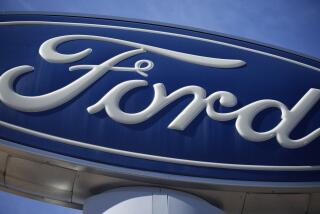Competition for truck buyers heats up
Trucks are the hottest segment of the U.S. auto industry this year, as housing and construction rebound and small businesses open the purse strings to replace aging equipment.
Sales are up 11% through the first four months of this year, far above the pace of car sales, according to Autodata Corp. The gains have come even though buyers have had to choose mostly from outdated models.
But that’s about to change.
General Motors will start delivering new-generation versions of its Chevrolet Silverado and GMC Sierra trucks to dealers later this spring. Toyota will put out a new Tundra pickup in September. And Ford is traveling the country, displaying its Atlas concept truck at auto shows and other events in an effort to hold buyers’ loyalty until the new F-150 goes on sale, probably as a 2015 model.
Dodge was the first to update its full-size truck, with the all-new 2013 Ram already in dealerships.
Expect a market-share battle as intense as what’s happening in the family sedan market, where nearly every major car company has introduced a redesigned model over the last two years.
“The competition will be brutal,” said Mike Wall, an analyst with IHS automotive.
Truck sales are crucial to the Big Three. GM, for instance, earns $9,000 to $11,000 from each pickup sale, compared with about $5,000 for a passenger car, according to Brian Johnson, an analyst with Barclays Research. The automaker sells about 1 million vehicles annually based on its big-truck platform, including sport utilities, providing the company with huge manufacturing economies, Wall said.
The F-series — the best-selling vehicle in the U.S. — also produces among the highest profit margins for Ford, Chief Financial Officer Robert Shanks said.
Ford sold nearly 650,000 F-series trucks last year. The Chevrolet Silverado was second at almost 420,000. The Ram pickup sold 300,000 units.
Toyota’s Tundra placed a distant fourth with sales of about 102,000, underscoring how Japanese automakers have struggled to break into the American-dominated segment.
All four automakers are going after buyers such as Dick Caley, a Long Beach real estate agent who likes to do his own maintenance on two aging Silverados. He is leaning toward another Chevy for his next truck.
“I like the long-term reliability,” he said. “And the customer service has always been pretty good.”
But he’s intrigued by the new Ram pickup, winner of the North American Truck of the Year award at the big Detroit auto show this year.
“The interior and performance numbers look interesting,” Caley said. “When I go shopping, I will look at what Dodge has.”
Truck buyers like Caley tend to be loyal, Wall said, but increased competition could break down that trend — with the Dodge Ram as a main beneficiary.
Ram, a brand owned by Chrysler, captured 19.2% of the pickup market in March, its best showing in years.
Sales were helped by a new engine choice, Chrysler’s Pentastar V-6 that produces 42% more horsepower, 13% more torque and 20% better fuel economy than the V-6 it replaced. The truck also comes with Chrysler’s 5.7-liter HEMI V-8 engine. Both engines are mated to more efficient eight-speed transmissions. The six-cylinder delivers best-in-class fuel economy of 18 mpg in the city and 25 mpg on the highway, Chrysler says.
“We saw the other manufacturers coming out with new trucks, and we knew that we really had to up our game,” said Scott Brown, a Chrysler spokesman.
General Motors is responding with the next generation of its Chevrolet Silverado and its sister GMC Sierra. Combined, the current models accounted for 36% of the full-size pickup market during the first quarter, narrowly trailing Ford’s 38%, according to auto information company Edmunds.com.
The new GM models will be vastly improved in ride, handling, fuel economy and power, said Michelle Krebs, an analyst with Edmunds.com. “But I was disappointed that the Chevy and the GMC aren’t more different than each other. About the only difference is the grille.”
Traditionally, the GMC version has been a more upscale offering.
Toyota will target truck buyers looking for luxury car amenities with two new premium trim levels on the Tundra. Options will include perforated leather seats — heated and ventilated — along with a 12-speaker JBL sound system, navigation and a blind-spot monitoring system.
The engines on the 2014 Tundra are largely carry-overs from the current generation, a combination of V-6 and V-8 choices that range from 270 horsepower and 278 pound-feet of torque — important for towing — to 381 horsepower and 401 pound-feet of torque.
Sales of the current Tundra rose almost 23% last year, and Toyota is hoping it can close in on the American companies.
Although it won’t have a new model in the market this year, Ford gave a surprise showing of the Atlas concept of the next generation F-series truck at the North American International Auto Show in Detroit in January.
“They are saying, ‘We may be coming a bit late in the product cycle, but we have a great truck coming — don’t forget it,’ ” Wall said.
Ford wants to shave 750 pounds from the current truck’s weight, Wall said. Ford said it has a “next generation” EcoBoost turbocharged engine in the works, along with a six-speed automatic transmission and an engine stop-start feature. All the improvements could boost fuel economy substantially.
The F-series has been the best-selling vehicle in America for 31 consecutive years and the best-selling truck for the last 36 years. The Atlas truck concept, appearing now at events nationwide, is meant to remind customers that Ford aims to stay on top, spokesman Mike Levine said.
“We don’t intend to give an inch in truck leadership,” he said.







